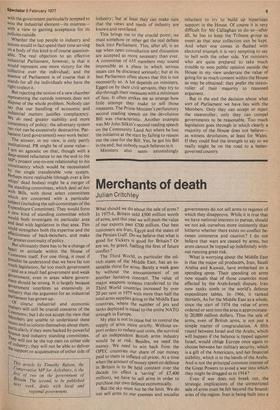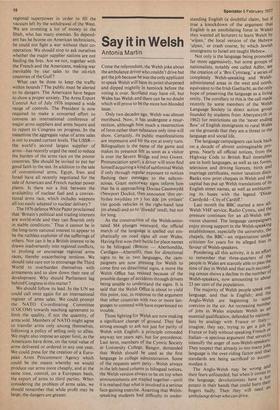Merchants of death
Julian Critchley
What should we do about the sale of arms? In 1975-6, Britain sold £500 million worth of arms, and this year we will push the value of our exports past £700 million. Our best customers are Iran, Egypt and the states of the Persian Gulf. Do we believe that what is good for Vickers is good for Britain? Or are we, by greed, fuelling the fires of future conflict? The Third World, in particular the oilrich states of the Middle East, has an insatiable thirst for arms. Barely a week goes by without the announcement of yet another lucrative contract. The value of major weapons systems transferred to the Third World countries increased by over 20 per cent in 1975 with more than half the total arms supplies going to the Middle East countries, where the number of jets and tanks deployed is equal to the entire NATO strength in Europe. MY Plea is not to cease but to control the supply of arms more strictly. Without export orders to reduce unit costs, the survival of an independent British arms industry would be at risk. Besides, we need the money. We need to win back from the OPEC countries our share of our money paid to them in inflated oil prices. At a time when the amount of money spent on defence in Britain is to be held constant over the decade (in effect a 'saving' of £7,400 million), we have to sell arms in order to purchase our own defence economically.
But the sky must not be the limit. We do not sell arms to our enemies and socialist
governments do not sell arms to regimes of which they disapprove. While it is true that we have national interests to pursue, should we not ask ourselves more insistently than hitherto whether there exists no conflict between commerce and caution? I do not believe that wars are caused by arms, but arms cannot be topped up indefinitely without running great risk. What is worrying about the Middle East is that the major oil producers, Iran, Saudi Arabia and Kuwait, have embarked on a spending spree. Their spending on arms now equals that of those countries most affected by the Arab-Israeli dispute. Iran now ranks ninth in the world's defence expenditure tables. In 1966, it ranked thirtieth. As for the Middle East as a whole, since the start of 1974 the value of arms ordered or sent into the area is approximately 20,000 million dollars. Thus the sale of arms, even of British arms, is not just a simple matter of congratulation. A fifth round between Israel and the Arabs, which will happen if the balance is tipped against Israel, would oblige Europe once again to choose between her military security, which is a gift of the Americans, and her financial stability, which is in the hands of the Arabs. And is not the principal common interest of the Great Powers to avoid a war into which they might be dragged as in 1914? Even if war does not break out, the strategic implications of the unrestricted sale of arms must be felt beyond the boundaries of the region. Iran is being built into a
regional superpower in order to fill the vacuum left by the withdrawal of the West. We are investing a lot of money in the Shah, who has many enemies. So dependent has he bcome on American technicians, he could not fight a war without their cooperation. We should stop to ask ourselves whether the major supplier nations are not feeding the fires. Are we not, together with the French and the Americans, making war inevitable by our sales to the oil-rich countries of the Gulf?
What can be done to keep the traffic within bounds ? The public must be alerted to its dangers. The Americans have begun to show a proper anxiety. The Arms Export Control Act of July 1976 imposed a wide range of controls. The President is now required to make a concerted effort to convene an international conference of major arms suppliers and arms buyers and to report to Congress on progress. In the meantime the aggregate value of arms sales is not to exceed current levels. The USSR— the world's second largest supplier of arms—has recently urged the need to reduce the burden of the arms race on the poorer countries. She should be invited to put her good faith to the test. In addition to the sale of conventional arms, Egypt, Iran and Israel have all recently negotiated for the sale of American and French nuclear power plants. Is there not a link between the availability of nuclear fuel and a conventional arms race, which includes weapons all too easily adapted to nuclear delivery ?
The 1976 defence White Paper proclaimed that 'Britain's political and trading interests are world-wide and they can flourish only in stable conditions.' Thus it cannot be in the long-term national interest to appear to be the ruthless exploiter of the sufferings of others. Nor can it be a British interest to be drawn inadvertently into regional conflicts, to prolong or encourage regional arms races, thereby exacerbating tensions. We should take care not to encourage the Third World to overburden themselves with armaments and to slow down their rate of development. Why should Parliament lag behind Congress in this matter ?
We should follow its lead. In the UN we could call once again for an international register of arms sales. We could prompt the NATO Co-ordinating Committee (COCOM) towards reaching agreement to limit the quality, if not the quantity, of arms sold. Members of NATO might agree to transfer arms only among themselves, following a policy of selling only to allies. We might also impose an upper limit, as the Americans have done, on the total value of arms delivered or ordered in any one year. We could press for the creation of a European Arms Procurement Agency which could be the means whereby we would produce our arms more cheaply, and at the same time, control, on a European basis, the export of arms to third parties. When considering the problem of arms sales, we should remember that while profit may be large, the dangers are greater.



































 Previous page
Previous page